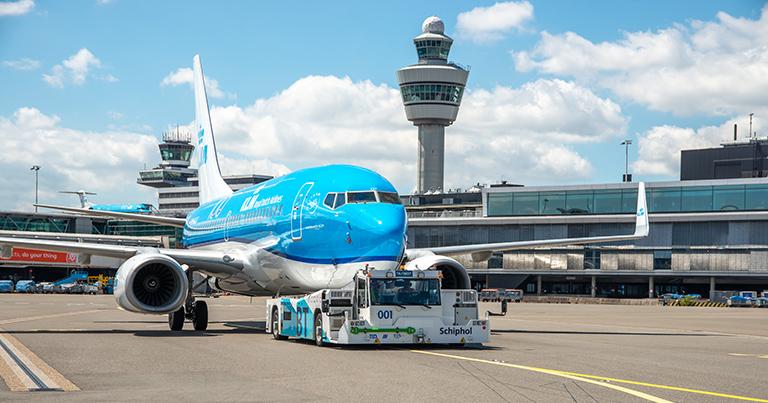
Amsterdam Airport Schiphol is investing in two TaxiBots, becoming the first in Europe to use the special towing vehicles that enable aircraft to taxi sustainably.
The sustainable taxiing process sees aircraft taken to and from the runway by a special towing vehicle, with the aircraft engines remaining largely switched off. The TaxiBots, supplied by Smart Airport Systems, will enter service at Schiphol in mid-2022.
A previous trial at the airport demonstrated that sustainable taxiing reduces fuel consumption during taxiing by around 50%, thereby lowering carbon, nitrogen and ultrafine particle emissions. Indeed, given the distance involved, fuel savings can reach up to 65% when aircraft taxi to the Polderbaan – Schiphol’s sixth, and most distant, runway.
“2022 is a crucial year for sustainability in the aviation sector,” said Dick Benschop, CEO Royal Schiphol Group. “We are accelerating measures to reduce emissions and improve local air quality. That’s important for the climate, our employees and local residents. We’re Europeans first and one of the few airports worldwide working on implementing sustainable taxiing on a large scale. Schiphol is a frontrunner, which makes me proud.”
Schiphol is collaborating with Netherlands Air Traffic Control, KLM, Transavia, Corendon Dutch Airlines, and the ground handling companies dnata and KLM Ground Services, to ensure sustainable taxiing becomes standard procedure at the airport.
The first step is deployment of the TaxiBots in a follow-up trial, in which TUI, Viggo and Swissport will also participate. This is part of a European initiative – the ALBATROSS project – which aims to develop and demonstrate more sustainable gate-to-gate flight operations, applying solutions to save fuel during each stage of a flight.






